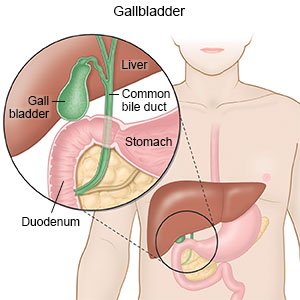Biliary Bypass
Medically reviewed by Drugs.com. Last updated on Apr 6, 2025.
What is a biliary bypass?
Biliary bypass is surgery to go around a blockage in your bile duct. A blockage can cause bile to build up in your gallbladder or liver. This can cause problems such as pain, itching, jaundice, and liver failure. Surgery will help bile flow out of your liver to your gallbladder or small intestine. This can help relieve signs and symptoms caused by the blockage. Biliary bypass may be done if you have a blockage that cannot be removed through another kind of surgery.
 |
How do I prepare for a biliary bypass?
- Your healthcare provider will tell you how to prepare for surgery. He or she may tell you not to eat or drink anything after midnight on the day of your surgery. He or she will also tell you what medicines to take or not take on the day of your surgery. You may need to stop taking blood thinners, aspirin, or NSAIDs several days before your procedure.
- You may be given antibiotics before surgery to help prevent an infection. Tell your healthcare provider if you have ever had an allergic reaction to antibiotics or to anesthesia.
Drugs used to treat this and similar conditions
Keytruda
Keytruda is used to treat multiple types of cancer such as melanoma, non-small cell lung cancer ...
Imfinzi
Imfinzi (durvalumab) is an immunotherapy used to treat types of lung cancer (NSCLC, SCLC), bile ...
Omvoh
Omvoh is used to treat moderate to severe ulcerative colitis or Crohn's disease in adults. This ...
Tibsovo
Tibsovo (ivosidenib) is a once-daily oral medication that targets a specific gene mutation called ...
Ziihera
Ziihera (zanidatamab) is a bispecific HER2-directed antibody used to treat HER2-positive biliary ...
Ivosidenib
Ivosidenib systemic is used for acute myeloid leukemia, biliary tract tumor, myelodysplastic syndrome
Pembrolizumab
Pembrolizumab (Keytruda) is a monoclonal antibody cancer medicine used to treat
Durvalumab
Durvalumab (Imfinzi) is an immunotherapy used to treat lung cancer (NSCLC, SCLC) and other cancers ...
What will happen during a biliary bypass?
You may have laparoscopic or robotic surgery. This means you will have a few small incisions in your abdomen. You may instead have open surgery. This means you will have one larger incision in your abdomen.
- You will be given general anesthesia to keep you asleep and free from pain during surgery. You may have laparoscopic surgery. This means you will have a few small incisions on your abdomen. You may instead have open surgery. This means you will have one incision in your abdomen.
- Your surgeon will make an incision in the bile duct before the blockage. Another incision will be made in the duct that is past the blockage, or in your intestine. Your surgeon will connect the first part of the bile duct to either the other part of the bile duct or to the intestine. This will create a new pathway for bile to flow. Absorbable sutures will be used to close the incision. Drains may be placed to removed extra fluid from surgery.
What should I expect after a biliary bypass?
You may have some pain after surgery. Talk with your healthcare provider about pain medicine to control the pain. You may be on a clear liquid diet right after surgery. Examples of clear liquids are broth, gelatin, and clear juice. You will begin to eat solid foods slowly. Soft foods may be given first to prevent nausea and vomiting. It may take a few months for you to heal completely after surgery.
What are the risks of a biliary bypass?
You may bleed more than expected or develop an infection. The area where bile drains may leak. You may develop problems digesting food, or you may have nausea and vomiting. The new connection may become narrow or blocked over time. You may need another procedure or surgery if this happens. You may get a blood clot in your limb. This may become life-threatening.
Care Agreement
You have the right to help plan your care. Learn about your health condition and how it may be treated. Discuss treatment options with your healthcare providers to decide what care you want to receive. You always have the right to refuse treatment. The above information is an educational aid only. It is not intended as medical advice for individual conditions or treatments. Talk to your doctor, nurse or pharmacist before following any medical regimen to see if it is safe and effective for you.© Copyright Merative 2025 Information is for End User's use only and may not be sold, redistributed or otherwise used for commercial purposes.
Further information
Always consult your healthcare provider to ensure the information displayed on this page applies to your personal circumstances.
